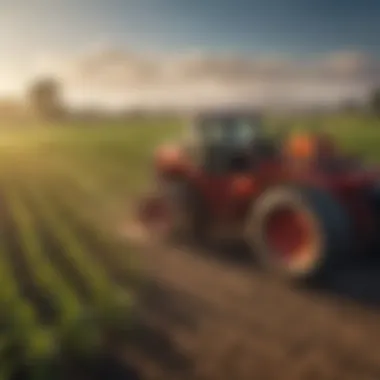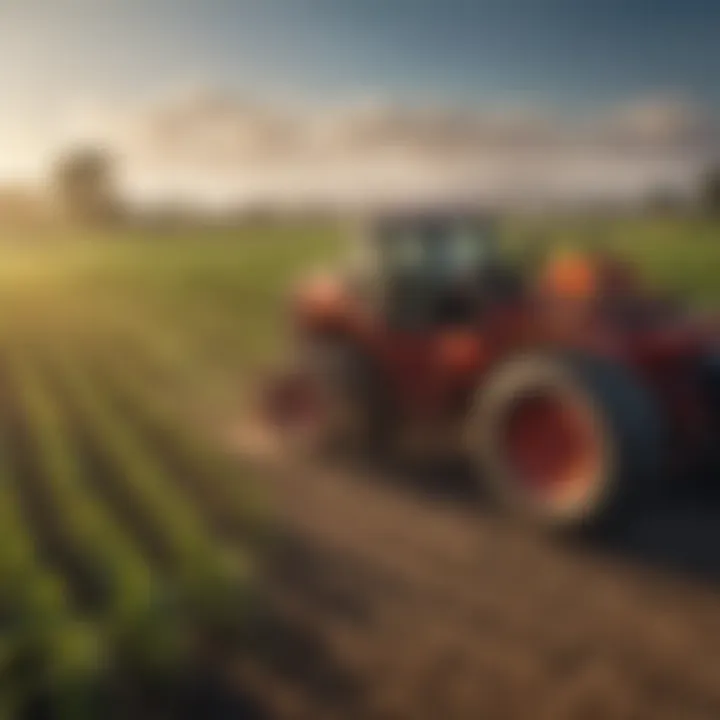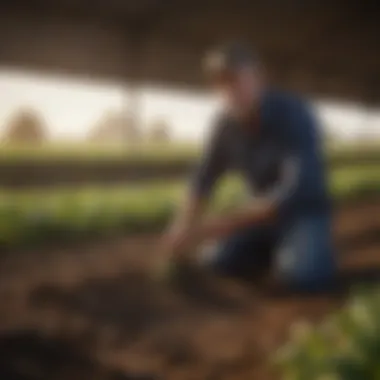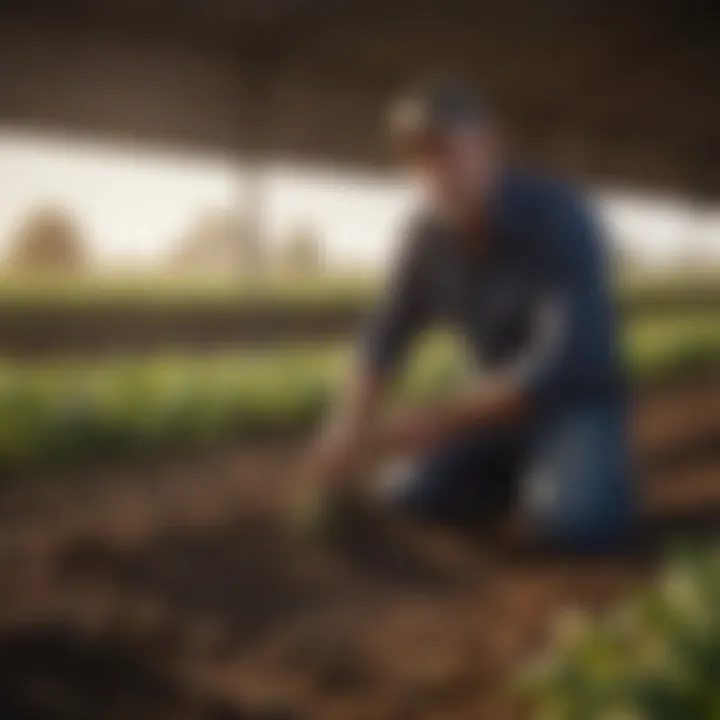The Critical Role of Agronomist Consultants in Agriculture


Intro
In today's agricultural landscape, a growing emphasis is placed on efficiency, sustainability, and innovation. Agronomist consultants play a critical role in this transformation. They bring a wealth of knowledge and practical experience to the table, serving as liaisons between scientific research and real-world application. This article explores their expertise and contributions to modern agriculture.
Research and Data Analysis
Latest Trends in Agriculture and Horticulture
Agronomists continuously monitor the latest trends influencing agriculture and horticulture. They analyze data to identify shifts in crop demand and emerging techniques. For example, precision agriculture, which utilizes GPS technology to analyze field variability, has become increasingly popular. This method allows for targeted interventions, maximizing output while minimizing input costs.
Another trend is the adoption of cover crops to improve soil health and reduce erosion. Agronomists guide farmers in choosing the appropriate cover crops that align with their specific goals and local conditions.
Statistical Insights into Crop Yields
Understanding crop yields is fundamental for advancing agricultural practices. Agronomists collect and analyze statistical data to track yield patterns over time. They assess factors such as soil quality, weather conditions, and pest pressures.
"Data-driven decisions are essential for modern farming. They enable farmers to make informed choices that benefit both the environment and their profits."
This information helps in refining crop management strategies and identifying potential areas for improvement. Effective use of data leads to enhanced productivity and sustainability.
Best Practices and Techniques
Efficient Crop Management Strategies
Efficiency in crop management is key to meeting global food demands. Agronomist consultants recommend various strategies to optimize resource use. Techniques like rotational cropping can reduce pest buildup and improve soil structure. These practices also encourage biodiversity, which is essential for resilient agroecosystems.
Additionally, agronomists advocate for effective irrigation practices. Employing technology such as soil moisture sensors can help tailor irrigation to crop needs, thereby conserving water and resources.
Sustainable Horticultural Techniques
Sustainability is paramount in modern horticulture. Agronomists promote practices such as organic farming, which avoids synthetic fertilizers and pesticides. They advise on integrated approaches that combine ecology with agricultural practices—ensuring healthier crops and ecosystems.
Educating farmers on composting and organic fertilizers can enhance soil fertility while reducing reliance on chemical inputs. Such practices can also lead to healthier produce, benefiting consumer health.
Pest and Disease Management
Common Pests and Diseases in Crops
Pest and disease outbreaks can devastate crop yields. Agronomists play a vital role in identifying common threats, such as aphids, nematodes, and various fungal diseases. Understanding the life cycles and habits of these pests allows agronomists to provide effective management strategies.
Integrated Pest Management Strategies
Integrated Pest Management, or IPM, is a comprehensive approach that agronomists advocate for managing pests. This method combines biological, cultural, and chemical practices tailored to specific scenarios. It focuses on minimizing harm to the environment while effectively controlling pest populations.
Farmers are encouraged to adopt regular monitoring practices, use of resistant crop varieties, and natural enemies to manage pest populations sustainably. This holistic approach reduces reliance on chemical interventions and promotes ecosystem health.
Prolusion to Agronomy
Agronomy serves as a foundational discipline in agriculture, encompassing the study of soil management and crop production. The significance of agronomy cannot be overstated, especially in the context of today's agricultural challenges. As the global population continues to rise, the demand for food production increases correspondingly. This amplifies the need for improved agricultural practices through innovative agronomic approaches. This section will clarify the definition and importance of agronomy, focusing on its contributions to sustainable agriculture.
Definition of Agronomy
Agronomy is a broad field that combines various scientific disciplines such as biology, ecology, and chemistry, to enhance crop production. It encompasses the evaluation and management of various factors affecting agricultural systems, including soil deversity, crop varieties, and environmental conditions. Agronomists study how these elements interact, which allows them to develop strategies that maximize yields while minimizing resource usage.
Through this systematic approach, agronomy not only supports the effective growth of crops but also addresses the environmental impact of agricultural practices. The application of agronomy is thus vital for any professional looking to improve farming results.
Importance of Agronomy
The importance of agronomy extends across multiple dimensions of agricultural practice. Here are several key reasons why the discipline is crucial:
- Enhancing Food Security: With the persistent rise in population, establishing sustainable agricultural systems becomes essential. Agronomists play a critical role in increasing crop productivity, which directly impacts food availability.
- Resource Management: Effective agronomy encourages the optimal utilization of resources such as water, nutrients, and energy. This not only contributes to sustainability, but also reduces the costs associated with farming.
- Adapting to Climate Change: Climate change poses significant challenges to agriculture, but agronomists are instrumental in developing adaptive strategies. They analyze climate data and recommend practices that increase resilience to varying weather patterns.
- Promoting Best Practices: Agronomy helps in the dissemination of best practices among farmers. Through agronomic research, farmers have access to improved cultivars, pest management strategies, and innovative farming techniques that enhance their production.
Agronomy is not just a science; it is a necessity for the future of agriculture. It bridges the gap between traditional practices and modern innovations.
In summary, the role of agronomy in contemporary agriculture cannot be overlooked. As agronomist consultants work to implement and develop these principles, they ensure that agriculture not only survives but thrives in the face of ongoing challenges.


The Role of Agronomist Consultants
The role of agronomist consultants is vital for the modern agricultural landscape. They bridge the gap between scientific knowledge and practical farming. Their expertise enables farmers to optimize crop production while adhering to sustainable practices. This section highlights their functions, responsibilities, and the invaluable support they provide to agricultural stakeholders.
Understanding Agronomist Consulting
Agronomist consulting involves providing expert advice and guidance on agricultural practices. These professionals possess a combination of education and field experience, allowing them to assess various farming conditions accurately. They analyze data, recommend solutions, and help implement practices that promote healthier crops and soils.
The consultants often collaborate with farmers, offering tailored advice as per the unique needs of each farm. Their role is not merely advisory; it also includes hands-on techniques that enhance productivity and sustainability. By working closely with farmers, agronomist consultants ensure that practices align with both economic goals and environmental considerations.
Key Responsibilities
When discussing agronomist consultants, it is necessary to analyze their key responsibilities, which encompass several crucial areas.
Crop Management
Crop management is a primary responsibility of agronomist consultants. They focus on improving yield through efficient use of resources. This area encompasses planning planting schedules, choosing appropriate crop varieties, and managing nutrient application.
The significant characteristic of crop management is its focus on maximizing output while minimizing waste. It is a beneficial choice for this article as it directly contributes to food security and economic viability for farmers. The unique feature of effective crop management is its reliance on data-driven decisions. Utilizing soil tests and climate models, consultants can enhance crop resilience against various factors. However, it requires regular monitoring and adaptation based on changing conditions, which can be demanding for farmers.
Consultation on Soil Health
Soil health consultation is another crucial aspect agronomist consultants manage. This responsibility involves evaluating soil conditions and providing recommendations for improvement.
Soil health is essential in agriculture as it affects crop productivity directly. The key characteristic here is understanding the biological, physical, and chemical properties of the soil. It is a popular choice for this article because healthy soil leads to better yields and sustainability. Agronomists assess soil health through a variety of methods, such as soil sampling and analysis. A significant advantage of prioritizing soil health is the long-term benefits it offers. Healthier soils can sequester carbon and reduce inputs needed for fertilizers and pesticides. One potential disadvantage is the time needed to see significant improvements, which may discourage some farmers.
Pest and Disease Management
Pest and disease management is a vital area where agronomist consultants contribute significantly. They assess the risks associated with pests and diseases and develop integrated management plans.
The primary focus in this area is minimizing crop loss and ensuring quality produce. The key characteristic is its proactive approach, which includes monitoring, identification, and control of threats to crops. This aspect is a beneficial inclusion in this article since effective pest management contributes to increased sustainability of practices. Consultants often rely on a combination of biological, cultural, and chemical controls tailored to the specific context of each farm.
A unique feature of pest and disease management is its emphasis on data collection and analysis. Regular monitoring helps identify new threats early on, thus minimizing the risk of devastating losses. However, a challenge exists as reliance on pesticides can inadvertently lead to resistance, requiring management strategies to evolve continually.
The integration of agronomist consultants into farming practices significantly enhances productivity and sustainability, ensuring that modern agriculture can meet the demands of a growing population.
Skills Required for Agronomists
Agronomists must navigate a complex landscape of agricultural systems and practices. Their role demands a solid foundation of essential skills that aid in improving farming efficiency and sustainability. In modern agriculture, these skills are vital not just for individual success but also for advancing the industry as a whole. They enhance decision-making, encourage innovative practices, and effectively address challenges faced by farmers today.
Educational Background
An agronomist's educational background is typically rooted in agricultural science, soil science, biology, or a related field. A bachelor’s degree in these areas helps them gain a fundamental understanding of the agricultural systems they will later influence. Higher level degrees, such as masters or PhDs, provide deeper knowledge in specialized areas. This educational progression equips agronomists with critical thinking and problem-solving abilities that are essential for addressing complex agricultural challenges. Moreover, continuing education is crucial as it allows agronomists to stay up-to-date with new research and agricultural methodologies.
Technical Skills
Data Analysis
Data analysis is a crucial skill for agronomists. It involves interpreting data collected from various sources such as experiments, surveys, and observations. The key characteristic of data analysis is its ability to inform decisions based on facts rather than assumptions. This aspect is beneficial in determining crop performance and soil health, leading to optimized farming practices. A unique feature of data analysis is its application of statistical tools that can reveal trends and correlations. However, the complexity of some analytical methods may pose challenges for agronomists who may not have a strong statistical background.
Research Methodologies
Research methodologies encompass various techniques and protocols agronomists use to gather and analyze data. This skill is essential for evaluating the effectiveness of agricultural practices and innovations. The key characteristic of robust research methodologies is their systematic approach, which helps ensure reliable results. This is beneficial for developing evidence-based practices. The unique feature of different methodologies—such as qualitative surveys or quantitative experiments—enables agronomists to adapt their studies to the specific context of their work. However, the time investment required for thorough research may limit its immediate applicability in some situations.
Field Experimentation
Field experimentation is the process through which agronomists test hypotheses in real-world farming settings. This aspect of their work provides valuable hands-on experience and direct insights into crop production and soil management. The key characteristic of field experimentation is its real-time data collection, allowing agronomists to observe and measure outcomes in controlled environments. This hands-on testing is a beneficial approach because it allows for adjustment and improvements during the experimentation phase. A unique feature of field experimentation is the direct feedback farmers can provide, which can enhance practical relevance. However, conducting experiments in diverse field conditions can introduce variability that may complicate the results.
Interpersonal Skills
While technical knowledge is important, agronomists must also possess interpersonal skills. These skills enable them to effectively communicate with farmers and agricultural stakeholders. Strong interpersonal abilities help in building trust and understanding diverse perspectives within the agricultural community. Furthermore, training farmers on new practices requires patience and clarity, making these skills invaluable. Effective interpersonal communication fosters collaboration, leading to more successful implementation of agronomic principles.
Consulting Processes in Agronomy
Consulting processes in agronomy are essential for the effective functioning of modern agriculture. They provide a framework for agronomists to interact with farmers and agricultural stakeholders. The process starts with understanding the unique challenges faced by each client. It involves thorough evaluations, tailored strategies, and ongoing assessment to ensure sustainable agricultural practices. As agricultural demands become more complex, these processes are critical for optimizing crop production and addressing environmental concerns. They also enhance communication and collaboration between agronomists and farmers.
Initial Consultation and Assessment


The initial consultation is a foundational step in agronomy. During this phase, agronomists gather pertinent information about the client's agricultural practices, land characteristics, and specific goals. This assessment may include site visits, soil tests, and crop evaluations. Understanding the client's needs is key to forming a strong partnership. Agronomists must listen carefully and ask precise questions to gather valuable insights.
This initial stage serves several purposes. It helps establish a solid understanding of the background and specific challenges affecting the farm. A detailed assessment also allows agronomists to align their recommendations with the client's objectives, ensuring a personalized approach.
Developing Action Plans
After the initial assessment, the next step is devising an action plan. This plan is vital for outlining strategies to address the identified challenges. Agronomists consider various factors such as crop selection, pest management, and irrigation techniques. Collaborating closely with clients, they design plans that are practical, achievable, and sustainable.
Action plans often include short-term and long-term goals. Short-term goals might focus on immediate crop health improvements. Long-term goals can involve techniques that enhance soil health or adapt to climate trends. The development of these plans requires technical knowledge combined with an understanding of the client's unique context.
Monitoring and Evaluation
Monitoring and evaluation are crucial components of the agronomy consulting process. This phase assesses the effectiveness of the action plans implemented. Agronomists regularly check on crop progress, soil conditions, and overall farm performance. Collecting data allows for adjustments in strategies when necessary.
Evaluations help in identifying successes and areas that need improvement. They ensure that sustainable practices are maintained over time while also adapting to changing conditions. Periodic evaluations foster a continuous feedback loop, strengthening the consulting relationship. Agronomists and farmers work together to refine methods, fully aiming for optimal crop production and environmental stewardship.
Technological Integration in Agronomy
Technological integration plays a critical role in modern agronomy. It encompasses a broad spectrum of tools and techniques that improve farming efficiency and sustainability. This integration allows agronomist consultants to leverage data-driven insights and cutting-edge technologies, optimizing crop production and maintaining environmental health. As agriculture increasingly faces challenges such as climate change and population growth, technology becomes indispensable. The focus on technological integration arises from the need for enhanced productivity while minimizing ecological footprints.
Role of Data Analytics
Data analytics is revolutionizing how agronomists approach farming. By collecting and analyzing large sets of agricultural data, consultants can identify trends, predict outcomes, and make more informed decisions. This can include crop yield predictions based on weather patterns, soil conditions, and historical data. Data analytics allows for precise assessments, enabling agronomists to advise farmers on the best practices for their specific conditions. For example, they can determine the optimal planting times, irrigation methods, and fertilizer applications, leading to increased yields and reduced waste.
Precision Agriculture Tools
Precision agriculture tools include various technologies, such as GPS mapping, soil sensors, and automated machinery. These tools help agronomists collect real-time data about soil health, moisture levels, and crop growth. Integrating these technologies allows for enhanced field management decisions. Farmers can apply inputs like water, fertilizers, and pesticides only where and when they are needed. This not only reduces costs but also limits the environmental impact of agricultural activities. Moreover, precision tools enhance the sustainability of farming practices, aligning with modern environmental standards.
Utilization of Drones and Remote Sensing
Drones and remote sensing technologies provide a bird's-eye view of agricultural land. They capture high-resolution images and data, allowing for better monitoring of crop health and field conditions. Agronomist consultants utilize these tools to identify problem areas, assess plant health, and inform management practices. By integrating drone technology into their consulting processes, agronomists can provide deeper insights into crop development, which traditional methods might miss.
"The future of agriculture depends heavily on the adoption of technology, guiding sustainability and productivity for generations to come."
In summary, technological integration in agronomy enhances the ability of agronomist consultants to deliver value to farmers. Data analytics, precision agriculture tools, and remote sensing technologies are pivotal in facilitating informed decision-making, optimizing resources, and ensuring sustainable agricultural practices.
Sustainability and Environmental Considerations
Sustainability and environmental considerations have become crucial in agriculture, particularly as the global population continues to grow. The aim is to ensure that farming practices do not compromise the ability of future generations to meet their needs. Agronomist consultants play a vital role in implementing sustainable practices that enhance productivity while safeguarding natural resources. This section explores various elements of sustainability within modern agriculture, discussing key areas such as sustainable farming practices, the impacts of climate change, and regulatory compliance.
Sustainable Farming Practices
Sustainable farming practices focus on reducing environmental impact while maintaining agricultural productivity. Agronomist consultants encourage various methods to achieve this. Some of these methods include:
- Crop rotation: This practice prevents soil depletion and pest accumulation, promoting healthier soil and crops.
- Conservation tillage: Reducing soil tillage preserves soil structure and prevents erosion. It also enhances soil moisture retention.
- Integrated Pest Management (IPM): IPM strategies combine biological, cultural, and chemical practices to control pests while minimizing environmental harm.
- Organic farming: This approach utilizes natural inputs, avoiding synthetic chemicals, thereby enhancing soil health and biodiversity.
By educating farmers on these practices, agronomist consultants help create a sustainable agricultural system that produces nutritious food while having minimal negative effects on the environment.
Impact of Climate Change
Climate change poses significant threats to agriculture, including altered precipitation patterns, increased temperatures, and extreme weather events. Agronomist consultants must navigate these shifts effectively to optimize agricultural resilience. They often assess the local impacts of climate change on crop production and advise on adaptive strategies. Key considerations include:
- Drought resistance: Planting drought-resistant crop varieties can help maintain yields in water-scarce conditions.
- Soil health: Healthy soils can better retain moisture and support crop growth, which is essential in a changing climate.
- Diversification: By diversifying crops, farmers can spread risk and improve resilience against climate-related stresses.
Agronomists offer insights into these challenges and support farmers in adjusting their operations to meet the evolving landscape of climate change.
Regulatory Compliance
Regulatory compliance is a critical component of sustainable agriculture. Agronomist consultants must stay informed about local, national, and international regulations affecting farming practices. Understanding these regulations helps farmers avoid legal issues and promotes environmental stewardship. Important areas include:
- Pesticide use: Regulations govern the application of pesticides to protect human health and the environment. Agronomists help farmers comply while maximizing pest control efficacy.
- Water usage: Many jurisdictions have laws regarding water conservation and usage in agriculture. Agronomists can assist farmers in implementing efficient irrigation practices that comply with these regulations.
- Soil conservation laws: Various regulations are in place to prevent soil erosion and degradation. Agronomists provide guidance on best practices to ensure compliance.
In summary, sustainability and environmental considerations encompass a wide range of practices and regulations. Agronomist consultants are essential in guiding farmers through these complexities to foster sustainable and productive agricultural systems.
Challenges Faced by Agronomist Consultants


Agronomist consultants play an essential role in improving agricultural practices, but they face a variety of challenges. These challenges can hinder their effectiveness and impact on the farming community. Understanding these obstacles is crucial for appreciating the role of agronomist consultants in modern agriculture.
Market Dynamics
Market dynamics refer to the forces that affect the supply and demand of agricultural products. Agronomist consultants must navigate a constantly changing landscape. Economic fluctuations, shifts in consumer preferences, and environmental regulations all influence agricultural practices.
The challenge lies in adapting strategies to meet these market changes. For example, a rise in organic food demand requires agronomists to provide insights that help farmers transition to organic practices effectively. Furthermore, fluctuations in commodity prices can affect investment in certain crops, leading to uncertainty in production choices.
The consultants must also stay informed about global trade policies and market trends. By doing so, they can offer timely advice to farmers, facilitating informed decision-making for crop selection and resource allocation.
Technological Adaptation
As technology affects all industries, agronomy is no exception. Agronomist consultants must adapt to new tools and methodologies. The integration of precision agriculture, data analytics, and advanced research techniques requires continual learning and flexibility.
Not all farmers can afford the latest technologies. Therefore, agronomists must frequently educate their clients about technology benefits and practical applications. Implementing technology also involves overcoming resistance from farming communities accustomed to traditional practices.
Moreover, keeping pace with rapid technological advancements can be daunting. The challenge is to evaluate which technologies provide real benefits versus those that are merely trends. Successful adaptation means recognizing the appropriate tools that align with the agricultural goals of their clients.
Client Relationships and Education
Building strong relationships with clients is crucial for agronomist consultants. However, various factors can complicate these interactions. Many farmers may lack a comprehensive understanding of agronomy, which can lead to mistrust or miscommunication.
Effective communication is vital. Agronomist consultants need to explain complex concepts in simple terms. Increasing education efforts on the importance of agronomy can help bridge this gap.
Furthermore, many farmers are skeptical of change. This skepticism can hinder the adoption of innovative techniques. Agronomists need to use practical examples, case studies, and demonstrations to show the benefits of their recommendations. This educational role fosters trust and helps build long-term relationships.
"The success of agronomist consultants lies not only in their expertise but in their ability to communicate and build trust within the farming community."
Future Trends in Agronomy Consulting
The field of agronomy is continuously evolving as new challenges and opportunities arise. Adapting to these changes is crucial for the effectiveness of agronomist consultants. Understanding future trends in agronomy consulting allows these professionals to stay relevant and provide valuable insights to farmers and agricultural businesses. The following sections explore specific elements shaping the future of agronomy consulting.
Emerging Technologies
Emerging technologies are reshaping agricultural practices. Innovations like artificial intelligence and machine learning are crucial tools for agronomist consultants. These technologies enhance data processing capabilities, allowing professionals to analyze large datasets efficiently. By integrating AI, agronomists can predict weather patterns, assess soil health, and optimize crop yield formulations.
Another significant technological advancement is the use of satellite imagery and GIS (Geographic Information System) applications. These tools enable agronomists to monitor crop performance and identify issues from a distance. This capability is invaluable in large-scale farming, where timely data can significantly impact decisions.
Furthermore, automation plays a crucial role in streamlining operations. By using robots and automated machinery in planting and harvesting, agronomists can reduce labor costs while increasing efficiency. This integration illustrates how innovation in technology can boost productivity and sustainability in agricultural practices.
Increased Focus on Organic Practices
The demand for organic products is steadily increasing as consumers become more health-conscious. Agronomist consultants are pivotal in guiding farmers towards organic farming practices. This transition requires knowledge of organic regulations, soil nutrition, and pest management without synthetic chemicals.
Consultants assist farmers in implementing sustainable practices that improve soil health. Techniques such as cover cropping and crop rotation enhance nutrient cycling and soil structure. These methods are not only environmentally friendly but also economically beneficial in the long run.
Additionally, agronomists help farmers navigate certification processes for organic products. Knowledge in this area is essential for farmers aiming to access premium markets. The future of agronomy consulting lies in effectively managing this shift towards organic practices, ensuring both farmers and consumers benefit.
Collaboration with Research Institutions
Collaboration with research institutions is becoming increasingly vital to agronomy consulting. Agronomists gain access to cutting-edge research, allowing them to implement evidence-based practices. This partnership fosters a learning environment that benefits all parties involved, including farmers.
By merging theoretical knowledge with practical applications, consultants can develop innovative solutions to challenges in agriculture. Moreover, research institutions often conduct trials that assess new methods and technologies. Agronomists can leverage these findings, providing farmers with reliable recommendations.
Moreover, educational outreach is a critical component of this collaboration. Workshops and seminars can educate farmers on recent advances and sustainable practices. As a result, both agronomists and farmers become better equipped to deal with future agricultural challenges.
Ending
In the context of modern agriculture, the conclusion highlights the crucial role that agronomist consultants play in enhancing farming practices and promoting sustainability. The insights gathered throughout this article underscore the multifaceted expertise that these professionals bring to the agricultural sector. Through their specialized knowledge, agronomists can optimize crop yields while ensuring soil health and environmental stewardship.
Summary of Key Insights
The article presents several key insights regarding the expertise and function of agronomist consultants:
- Expertise in Crop Management: Agronomist consultants proficiently navigate the complexities of crop production, utilizing advanced techniques to maximize output.
- Advisory Role on Soil and Pest Health: Their guidance on soil management and pest control is vital in mitigating risks and enhancing plant health.
- Integration of Technology: The infusion of technological tools into their consulting process allows for precise monitoring and better decision-making.
- Focus on Sustainability: They advocate for sustainable farming practices, effectively addressing environmental concerns while promoting long-term agricultural viability.
These points illustrate that agronomist consultants are not merely advisors; they are essential partners in modern farming. Their insights drive better farming practices that align with both productivity and ecological responsibility.
The Importance of Agronomist Consultants for the Future
Looking ahead, the significance of agronomist consultants is poised to grow even further. As agriculture faces increasing pressures from climate change, population growth, and evolving market demands, the expertise that agronomists provide becomes more relevant.
- Adaptation to Challenges: Agronomists are well-equipped to help farmers adapt to changing conditions, offering solutions that are both innovative and practical.
- Advancement of Organic Practices: With the rising consumer demand for organic produce, agronomists will play a pivotal role in helping growers transition to organic farming through tailored strategies.
- Research Collaboration: Their partnerships with research institutions can lead to breakthroughs that create sustainable agricultural practices, benefiting not only individual farmers but also the wider agricultural community.















